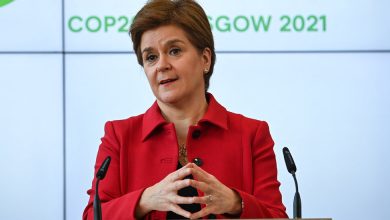Europe Fears That Rising Cost of Climate Action Is Stirring Anger

PARIS — Raucous demonstrations against high energy bills in Spain. Demands for social protection in Greece as coal mines close. Fresh protests in French rural areas and small towns over spiking petrol prices.
As world leaders gather for a United Nations conference in Glasgow to tackle the threat of climate change, attention is pivoting to one of the biggest risks involved in decarbonizing the planet: ensuring that the costs of the green transition don’t set off a populist backlash.
The worries are especially acute in Europe, where policymakers are expressing growing alarm over the possibility of social unrest and a weakening of public support if the burden of shifting from cheap fossil fuels falls too heavily on poor and middle-income households.
“The climate transition remains a risk for all democracies, because it will be very costly — far more costly than expected,” France’s finance minister, Bruno Le Maire, said in a recent interview.
“If we are not cautious, we run the risk of having a new Yellow Vest movement” that could crop up “everywhere in Europe,” he said.
Those fiery protests in France in 2018, named for the millions who donned fluorescent hazard vests as a sign of economic distress, are seared on the minds of many European leaders as they move forward with policies to make the continent a net-zero emitter by 2050. The protests began as an outcry over a fuel-tax increase imposed by Paris elites and exploded into a nationwide pushback over inequality and financial insecurity.
The urgency to prevent fresh discontent points to the challenges facing nearly all industrialized countries at the conference in Glasgow, known as COP26. The Yellow Vest rallies in 2018 highlighted in stark and sometimes violent fashion the risk of losing political buy-in from citizens who are faced with rising costs to drive cars, heat homes and run appliances.
“People have to think about the end of the month before they can think about the end of the world,” said Guy Ryder, director-general of the International Labor Organization, a United Nations agency.
“If governments neglect to incorporate labor market outcomes, societal costs and notions of fairness into their climate transition policies,” he added, “people will stand back from supporting action on climate change.”
The United States on Thursday moved toward the largest action it has ever taken to address climate change, setting aside $555 billion in President Biden’s huge spending bill, including financial inducements to encourage the use of wind, solar and nuclear power.
Europe has laid out its own ambitious blueprint to pivot away from fossil fuels over the next nine years, accompanied by policies aimed at ensuring a so-called “just transition” for vulnerable people as efforts to meet future climate targets directly affect the lives and livelihoods of millions.
But surging energy prices have complicated Europe’s lofty goals, leaving governments scrambling to offset the impact on households as signs popular discontent rise.
Europe has leaned heavily on natural gas to power homes and businesses while it builds out green energy infrastructure. That is leaving the continent vulnerable to fluctuating prices driven by a global recovery from the pandemic, and spurring a divide between countries that see the crisis as a reason to delay — or speed up — a green energy transition.
In Spain, the government is taking emergency steps to redirect profits from energy companies to consumers after demonstrators in some towns smashed windows at energy company offices and thousands of poor families switched off power because they couldn’t pay.
Prime Minister Mario Draghi of Italy unveiled a 3 billion euro package intended to have a “strong social impact” for poorer households and small businesses. President Emmanuel Macron is subsidizing energy bills in France through the winter and paying 100 euros (about $116) a month to low-earners after small protests emerged recently in central France, a Yellow Vest heartland.
And in Greece, the government is trying to soothe ire by redirecting money earned from Greece’s carbon emissions trading scheme toward household energy subsidies — while making sure to publicize that the funds come from a tool to combat climate change.
“We will need these types of mechanisms to make sure that poorer people don’t pay the price,” Prime Minister Kyriakos Mitsotakis said in an interview. “Because if that were to happen, it would create a wave against the green transition that would undermine the whole effort.”
Even before the recent energy crunch, some governments were warning that Europeans might not be ready to make the sacrifices needed for a carbon-free future. Beyond the short-term pain of energy bills are the longer-term structural challenges from a fundamental shift in the global economy as it is moves away from fossil fuels.
A seismic upheaval in the way goods and services are produced will affect millions of jobs in fields as diverse as energy, agriculture, construction, shipping, finance, engineering, retail and even fashion, altering the social welfare needs of people who will require new skills and training to adapt. Electric cars require fewer parts, and in France alone up to 120,000 jobs across the auto industry are expected to be lost.
While up to 24 million new jobs linked to the green economy could be created by 2030, according to International Labor Organization estimates, “the risk is that skills may be too slow to adjust,” said Patrick Artus, chief economist of the Paris-based Natixis bank.
Nations that signed onto the Paris Agreement in 2015 pledged to target so-called just transition policies in their climate blueprints, promising fair employment and energy affordability for people and businesses affected by the pivot. Europe has carved out up to €75 billion for its plan, which provides targeted support to help governments ease the social and economic impact in hard-hit regions.
The money is flowing to countries like Greece, which is accelerating the closing of dirty lignite coal mines as it tries to create a clean energy economy. To win citizens’ backing for the shutdowns, affecting over 8,000 mining jobs, the government is proposing retraining and relocation programs, and seeking investments for carbon-neutral farming, solar farms and sustainable tourism to create new employment opportunities.
Still, how to pay for the transition — and who should shoulder the bill for the most vulnerable — will remain one of the biggest challenges for decades to come. Rich nations vowed last week to raise $100 billion a year to help poor countries address climate change — well after the pledge was written into the 2015 Paris accord.
The European Union aims to raise money directly from financial markets by issuing up to €250 billion worth of green bonds, an increasingly popular instrument among investors, to help member states finance these efforts. And negotiators at the COP26 meeting will face a reckoning over the thorny issue of setting a price on carbon for big polluters.
At the end of the day, the social and economic inequalities arising from the transition must be resolved, said Lucas Chancel, a co-director of the Paris-based World Inequality Lab and an author of a recent study concluding that a key way to bridge that gap is with higher taxes on the wealthiest and on the biggest gainers from globalization.
“To address the issue of who should pay for the transition, you need to target who is contributing most to the problem,” he said. The study showed that the world’s richest 10 percent emitted nearly half of global emissions in 2019, while the poorest half of the global population was responsible for 12 percent.
“There will be no moving forward with the green transition without large scale redistribution,” Mr. Chancel said. “If we don’t redistribute wealth to accompany low- and middle-income groups, then the transition is not going to work out,” he said.



